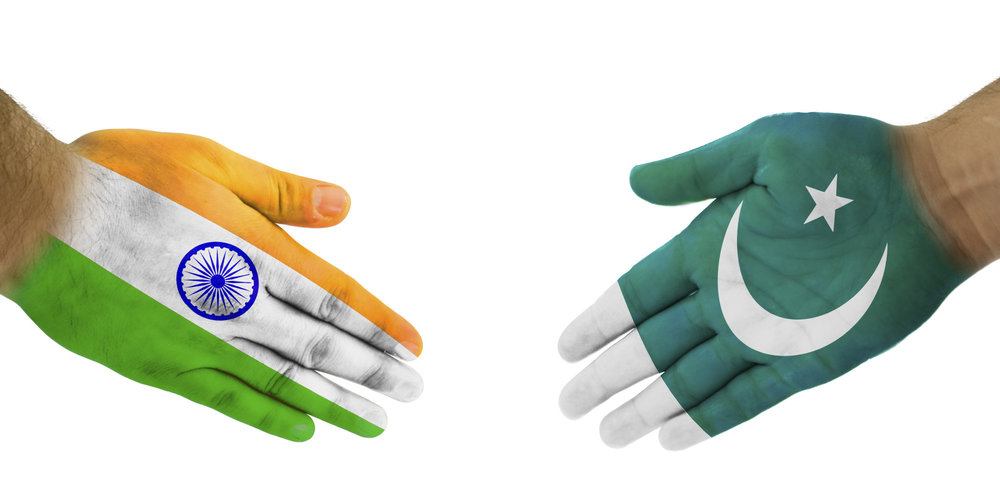India, Pakistan look to bury the hatchet and create space for betterment of ties

TEHRAN - India and Pakistan, the two South Asian warring neighbors, have been at loggerheads over the issue of Kashmir since 1947. The two countries have gone to war on two occasions and despite the strenuous efforts made by peaceniks on both sides, the bilateral relations have failed to mend.
In recent years, the ties between the two nuclear-armed neighbors have gone downhill with the intermittent exchange of small-arms and mortar fire along the border. India accuses Islamabad of sponsoring terrorism and providing sanctuary to anti-India militant groups, while Pakistan accuses India of fuelling insurgency in the restive Baluchistan province.
The accusations and counter-accusations have virtually put the peace process on backburner and peace parleys have been replaced by sabre-rattling and war-mongering from both sides.
There have been moments in history when the two sides came close to resolving the long-standing issue of Kashmir, especially the Agra Summit of 2001. Former Pakistan foreign minister Khurshid Mahmud Kasuri in his book ‘Neither a Hawk, Nor a Dove’ writes that the “solution to Kashmir was in the grasp of both governments” that time.
The then president of Pakistan Parvez Musharraf had proposed what was known as ‘Four-point formula’ to Kashmir, which, according to political observers, was, in principle, acceptable to Indian prime minister Atal Bihari Vajpayee. However, the deal fell through hours before the signing ceremony.
The change of guard in Islamabad has once again inspired optimism that the issue of Kashmir will see headway. In his victory speech, the prime minister-in-waiting Imran Khan showed willingness to engage with India on Pakistan, and said Pakistan will walk two steps if India agrees to walk one step on Kashmir.
India’s prime minister Narendra Modi even made a surprise phone call to Khan and hoped that democracy will take deeper root in the neighboring country. He also invited him to visit India.
Pakistan termed PM Modi's call to Khan, post-election victory, as a very positive indication in the bilateral relationship, a welcome change from the Nawaz Sharif government’s bitter relations with India. During Sharif’s time, the ties between the two countries had frayed after New Delhi alleged that Pakistan-based terrorist groups were carrying out attacks on Indian military camps.
Pakistan's High Commissioner to New Delhi Sohail Mahmood, speaking at a function in New Delhi to mark Pakistan’s Independence Day on Tuesday, said the peculiar trajectory of India-Pakistan relations over the past 71 years often led to political and military tensions and prevented the two countries from realizing their potential in socio-economic development.
“The phone call by Prime Minister Narendra Modi to Chairman PTI Imran Khan was another positive development. It is being hoped that such steps on both sides would create the space for the betterment of ties between India and Pakistan,” Mahmood said.
India’s Independence Day falls on August 15, a day after Pakistan celebrates its Independence Day. On August 15, 1947, the erstwhile British India was divided into Hindu-majority India and Muslim-majority Pakistan. The partition saw the displacement of millions and violent protests, the effects of which remain for both nations even today.
As a goodwill gesture, 30 Indian prisoners were freed by the Pakistani authorities on Monday, which included Gajender Sharma who was lodged in a Pakistani jail for the last 36 years on the alleged charges of spying.
“Government of Pakistan has decided to release 30 Indian prisoners, including 27 fishermen on 13 August 2018. This is a humanitarian gesture to mark Pakistan's Independence Day on 14 August," Pakistan's Ministry of Foreign Affairs (MoFA) said in a statement.
Meanwhile, in an identical gesture, India released six Pakistani civil prisoners and one fisherman. The prisoners were handed over to Pakistan Rangers by India's Border Security Force at Attari-Wagah border crossing.
In another significant move, India’s Border Security Force and Pakistani Rangers exchanged sweets at a ceremony on the international border in Punjab on the occasion of Pakistan's 72th Independence Day on Tuesday. The two sides had skipped exchanging sweets in recent times due to border tensions.
Political analysts see these recent developments as an indication of growing bonhomie between the two estranged neighors, which augurs well for regional peace and stability.
“The release of prisoners from both the governments is extremely significant as it augurs well for relations between them and for peace in the region,” says Amit Burauh, a New Delhi based strategic affairs analyst. “Under Imran Khan’s government in Islamabad, we expect the Indo-Pak bilateral ties to improve, and he has already made a start towards that by issuing some positive statements.”
